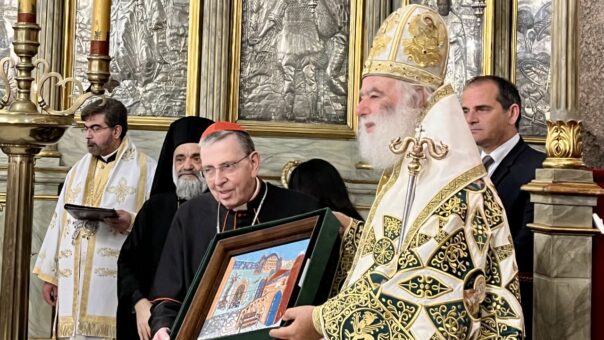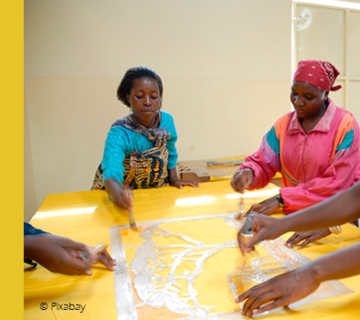The Joint International Commission for Theological Dialogue between the Catholic Church and the Orthodox Church held its fifteenth plenary session from 1st-7th June 2023 in Alexandria, Egypt. It was hosted by the Greek Orthodox Patriarchate of Alexandria and All Africa. Agreement was reached on a new document entitled “Synodality and Primacy in the Second Millennium and Today”. We interviewed theologian Piero Coda, who attended the meeting.
Fr. Coda, can you tell us how it went, who took part and what was the main objective?
It was the 15th plenary session of the “Joint International Commission for Theological Dialogue between the Catholic Church and the Orthodox Church” which was held in Alexandria, Egypt, under the chairmanship of Metropolitan Job of Pisidia (Ecumenical Patriarchate of Constantinople) and Cardinal Kurt Koch (Dicastery for the Promotion of Christian Unity), with the cordial hospitality of Patriarch Theodoros II of Alexandria.
It was a question of completing the stage of dialogue inaugurated by the document of Ravenna (2007). After developing the theological framework shared by Orthodox and Catholics about the interdependence of synodality and primacy in the life of the Church, it provided an historical examination of the situation experienced in the first millennium, proposed by the document of Chieti (2016) and reached a description of the situation experienced in the second millennium, which was the object of the document approved in Alexandria.
Due to the well-known vicissitudes which torment the Orthodox world, the Patriarchate of Russia left the work of the Commission. There were no representatives of the Patriarchates of Antioch, Bulgaria and Serbia at the meeting in Alexandria, while the remaining 10 delegations of the other Patriarchates (Constantinople, Alexandria, Jerusalem, Romania, Georgia) and the autocephalous Churches (Cyprus, Greece, Poland, Albania, the Czech Republic and Slovakia) were present.
In what terms is it possible to speak of Synodality in the ecumenical sense and what considerations emerged also taking the past into account?
 The theme is illustrated in the Introduction: “The present document considers the troubled history of the second millennium (…) It strives to give as far as possible a common reading of that history, and it gives Orthodox and Roman Catholics a welcome opportunity to explain themselves to one another at various points along the way, so as to further the mutual understanding and trust that are essential prerequisites for reconciliation at the start of the third millennium.” The result is a clearer and more shared understanding of the reasons that have led, not infrequently for reasons of a historical-political rather than theological nature, to encourage a distance that has not only prevented attempts at reconciliation made over the centuries from coming to fruition, but has exacerbated the polemical interpretation of the other party and the apologetic stiffening of its position. The enhancement of openness to a new situation marked by the rapprochement that occurred in the twentieth century must be noted: it favours a more pertinent assessment of the actual meaning and theological weight of what still prevents full and visible unity.
The theme is illustrated in the Introduction: “The present document considers the troubled history of the second millennium (…) It strives to give as far as possible a common reading of that history, and it gives Orthodox and Roman Catholics a welcome opportunity to explain themselves to one another at various points along the way, so as to further the mutual understanding and trust that are essential prerequisites for reconciliation at the start of the third millennium.” The result is a clearer and more shared understanding of the reasons that have led, not infrequently for reasons of a historical-political rather than theological nature, to encourage a distance that has not only prevented attempts at reconciliation made over the centuries from coming to fruition, but has exacerbated the polemical interpretation of the other party and the apologetic stiffening of its position. The enhancement of openness to a new situation marked by the rapprochement that occurred in the twentieth century must be noted: it favours a more pertinent assessment of the actual meaning and theological weight of what still prevents full and visible unity.
What are the future prospects?
The document emphasizes that the “return to the sources” of the faith and the strategy of the dialogue of charity between the “sister Churches” promoted, in the wake of Vatican II, by Paul VI and Patriarch Athenagoras, are significant. The Catholic Church’s commitment today, tenaciously desired by Pope Francis, to rediscover and reactivate the principle of synodality also stimulates hope.
What lies ahead? The document states that, “The Church is not properly understood as a pyramid, with a primate governing from the top, but neither is it properly understood as a federation of self-sufficient Churches. Our historical study of synodality and primacy in the second millennium has shown the inadequacy of both of these views. Similarly, it is clear that for Roman Catholics synodality is not merely consultative, and for Orthodox primacy is not merely honorific”. Therefore, the interdependence between synodality and primacy, this was the firm point which was achieved, “is a fundamental principle in the life of the Church. It is intrinsically related to the service of the unity of the Church at the local, regional and universal levels. However, principles must be applied in specific historical settings (…) What is required in new circumstances is a new and proper application of the same governing principle.” This perspective paves the way for the continuation of the journey and the opening of a new phase.
Carlos Mana e Maria Grazia Berretta
(photo: ©Dicastero per la promozione dell’Unità dei cristiani)


 Italiano
Italiano Español
Español Français
Français Português
Português




J’ai enregistré le texte très intéressant de Chiara et de Don Foresi sur la prière et vais essayer de les transmettre à des confrères. Merci pour toutes ces nouvelles. Jacques-Marie Pétin